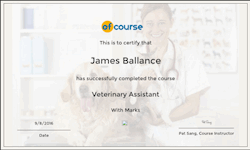Veterinary Assistant Training
OfCourse
Summary
- Certificate of completion - Free
- Tutor is available to students
Add to basket or enquire
Overview
Ever wanted to care for vulnerable and sick animals, but lacked the necessary qualifications to work in veterinary care? This course will provide you with all of the skills required to become a veterinary assistant or in a veterinary nursing role, with a full explanation of the role an assistant can play in a veterinary practice.
Certificates
Certificate of completion
Digital certificate - Included
Course media
Description
Course Highlights
- 65 lectures with over 1 hour of video support
- Detailed video and powerpoint content by recognised leader in veterinary training
- Learn the necessary skills to become a veterinary assistant
- Learn how to prevent infection, handle animals with care, and the legal restrictions on a veterinary assistant
- In course quizzes to test your knowledge
Course Overview
This course is indispensable for any person who has always wanted to work in veterinary care, but who lacked the skills and understanding to make the next step. Take this course today as the first step towards your dream of caring for needy animals today!
Instructor Bio
Your course instructor is Pat Sang, the Director of Animal Biology Care Ltd an ABC Awards accredited centre. Pat took a first-class degree in Environmental Biology and has worked as a lecturer in Animal Science and Management for the past 10 years. She has privately tutored biology, and been a course writer and long-distance home tutor for various learning companies and private clients.
Her distance learning courses have been recognised professionally, resulting in the approval of three awarding bodies for delivery of UK regulated qualifications including the ABC Awards Animal Nursing Assistant courses, Practical Animal Care and others. You can learn today the role that an assistant plays in the treatment of animals, the necessary steps required to minimise infection and how to handle specific animals such as cats, dogs and guinea pigs.
Course Curriculum
Introduction
Intro
Course Manual
Being a Veterinary Assistant
1.1 Learning Outcome
1.2 The VSA 1966
1.3 What does the VSA say?
1.4 Who do you have to report to?
1.5 What operations are you allowed to do?
2.1 What you can do as a Veterinary Assistant
2.2 Professional Standards
Basic Animal Anatomy
1.1 Basic Animal Anatomy
1.2 Cell Structure
1.3. Labelling a Cell
1.4. Cell components
1.5. 3-D Cell Diagram
2.1. What do you need to know about animal cells?
2.2 Basic Tissue Types
2.3 Epithelial Tissue
2.4 Connective Tissue
2.5 Muscular Tissue
3.1 Organs
3.2 Organs of the Digestive System
3.3 Digestive System's link with Tissue Types
3.4 Whole Animal
3.5 Take the Quiz - Basic Animal Anatomy
Animal First Aid
1.1 Learning Outcome
1.2 Animal First Aid
1.3 The Principles of First Aid
2.1 Keep the Animal Warm
2.2 Check the Airway is Clear
2.3 Arrest the Bleeding
2.4 Check Circulation
2.5 Order of Treatment
2.6 Heart Treatment
2.7 Assisted Treatment
Infection Control and Zoonosis
1.1 Learning Control
1.2 Zoonosis
1.3 Ringworm
1.4 Ringworm Infection
2.1 Infection Prevention
2.2 WHO Six Step Hand Washing Procedure
2.3 WHO Six Step Diagram
3.1 Prevention
3.2 Personal Protective Equipment (PPE)
3.3 Methods of Cleaning
3.4 Take the Quiz - Infection Control and Zoonosis
Handling Animals
1.1 Learning Outcome
1.2 How Not to Handle a Cat
1.3 Better Cat Handling
1.4 How not to Handle a Rabbit
1.5 What do you think of this method to handle a Rabbit?
1.6 The correct way to handle small animals
2.1 Guinea Pig
2.2 How not to handle a Dog
2.3 How to Handle a Small Dog
2.4 How to Handle a Bigger Dog
3.1 Serious Handling Equipment 1
3.2 Serious Handling Equipment 2
3.3 Serious Handling Equipment 3
Caring for Sick Animals
1.1 Learning Outcomes
1.2 Monitoring
1.3 Veterinary Terminology
2.1 Questions
2.2 Answers
2.3 Take a Quiz - Caring for Sick Animals
Quiz
Part 1 - Being a Veterinary Assistant
Part 2 - Basic Animal Anatomy
Part 3 - Animal First Aid
Part 4 - Infection Control and Zoonosis
Part 5 - Handling Animals
Part 6 - Caring for Sick Animals
Why Choose OfCourse Learning?
- All courses are taught by verified experts
- Students enjoy 24/7 access to their courses
- Courses can be accessed on any device
- Students get lifetime access to their courses so they can work at their own pace
- On completion, students receive a course certificate from a recognised educational institution
- Become a part of a global learning community where you can talk with teachers and students about the course
Who is this course for?
- Beginners interested in becoming Veterinary Assistants
- Those with an interest in animal care or Veterinary Practice
- Those training to be veterinary assistants looking to test their knowledge or brush up
Requirements
There are no prerequisites for this course
Career path
This course is ideal for those with an interest in a career focusing on animal care or Veterinary Practice.
Reviews
Legal information
This course is advertised on reed.co.uk by the Course Provider, whose terms and conditions apply. Purchases are made directly from the Course Provider, and as such, content and materials are supplied by the Course Provider directly. Reed is acting as agent and not reseller in relation to this course. Reed's only responsibility is to facilitate your payment for the course. It is your responsibility to review and agree to the Course Provider's terms and conditions and satisfy yourself as to the suitability of the course you intend to purchase. Reed will not have any responsibility for the content of the course and/or associated materials.



